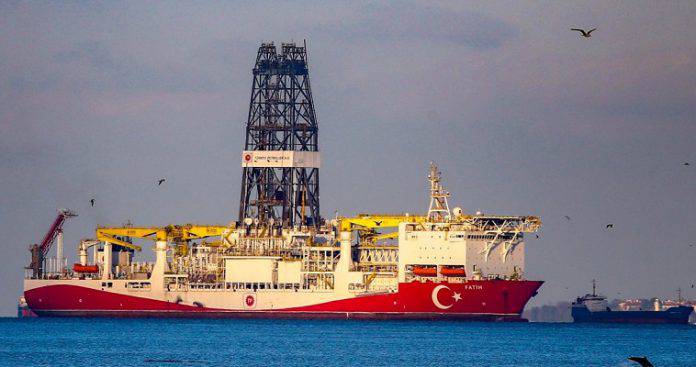Giorgos Iliopoulos: Erdogan’s mammoth gas field – Much ado about nothing
23/10/2020
Just a month ago, Turkey proceeded with much fanfare to announce the location of a giant gas field in the Black Sea, “Tuna-1”, at a depth of 4,525 meters, the largest to date in the sea area. The discovery was hailed by President Erdogan, who said it was the largest energy discovery in Turkish history, turning Turkey into a lever for changing the energy horizon.
At the same time, he claimed, it is expected to develop into an event that will transform Turkey, removing the shadow of its decades-long energy pessimism. The discovery coincides with the wider turmoil in the Eastern Mediterranean and the Aegean, which is escalating tensions with Greece and Cyprus, although a majority of energy analysts are skeptical about whether or not “Tuna-1” ( will probably be renamed “Sakarya”) has some special value, able to be the basis for the energy renaissance of Turkey.
President of Turkey, Recep Tayyip Erdogan arrives to give a press conference after the cabinet meeting at the Presidential Complex in Ankara, Turkey, on September 21, 2020. (Photo by Adem ALTAN / AFP) (Photo by ADEM ALTAN / AFP via Getty Images )
The first bizarre fact in the discovery of the Turkish TPAO focuses on the size of the “Sakarya” deposit estimated at 320 billion cubic meters (BCm), which is at least four times the largest deposit so far in the Black Sea, the Romanian submarine field Neptun estimated at 42-84 BCm. The comparison with this deposit, which is also located between the Upper Miocene and Pliocene sandstone layers, may offer some useful data for the possible production curve in “Sakarya”, if and when it develops at this stage.
Absence of energy groups
However, the Romanian deposit “Neptun” is still struggling to obtain the FID-Final Investment Decision, which has been postponed for 2021 and which is estimated to be combined with the sale of the 50% share of Exxon- Mobil in another group. Considering that the only other Turkish deposit in the Black Sea, the “Akcakoca” yields on an annual basis 0.2-0.3 BCm and its reserves are 100 times smaller than the “Sakarya”, the new discovery is reminiscent of a giant compared to pygmies!
Most major energy projects in the Black Sea, or even those that are considered important to implement, have their starting point in the entry of a consortium into the program, with extensive experience in in-depth underwater exploration. For example, the Bulgarian “Han-Asparuh” (originally a consortium of OMV, Total, and Repsol, although the latter has left), or the Romanian “Neptun”, just 100 km from “Sakarya”, the main contractor is an internationally recognized group.
Its main feature focuses on its extensive experience in underwater exploration and pumping and usually forms a consortium, in which it retains the first say. Turkish TPAO always cooperates with Shell or Exxon-Mobil in the Black Sea. In the case of “Sakarya”, only the Turkish NOC appears, with dubious experience in submarine drilling and without any other significant energy scheme, a fact that has no precedent in Black Sea research.
A narrative for internal consumption
Given that the EU’s patience seems to be coming to an end, the discovery in the Black Sea enables the Turkish leadership to prove that it has the power to discover and exploit any energy field in which it asserts its rights. This means that not only does it have the necessary military strength to threaten Cyprus or Greece, but it also possesses the necessary scientific competence and know-how to research, discover, and ultimately exploit large submarine energy reserves.
The move in the Black Sea is a sign of an excellent domestic policy in a country that is sinking into a deadly economic vortex, in defiance of the possible reactions of Brussels in water zones, which due to Cyprus fall under their jurisdiction. The political implications of Sakarya’s discovery are also underscored by the fact that Erdogan himself is announcing the great event of the discovery and not just top company officials.
The outbreak of the pandemic, which is affecting all the economies of Eurasia, has caused major problems inside Turkey, although the data it announces are considered unreliable and are not included in the international application Corona Tracker that monitors the evolution of the pandemic. The World Bank has made very negative assessments of the country’s economic situation, although Finance Minister and Erdoğan’s son-in-law Berat Albayrak says in all tones that no particular problems are being addressed.
But consumer purchasing power is already moving in negative territory and the devaluation of the lira, combined with the depletion of foreign exchange reserves, are the worst time bomb for the country’s financial system. The energy breakthrough comes at a time when the sharp escalation of tensions in the Caucasus is not enough to divert public opinion in other directions, but even if for a short time it offers the required communication coverage, it will soon have to be replaced by a new communication scheme of similar scope.
The numbers don’t add up
Almost immediately after the announcement of the discovery of the new deposit, Turkish energy analysts proceeded to the first calculations for a possible annual production of 10 BCm, thus causing new estimates for possible savings of 2.5-3.0 billion. on an annual basis, provided that the cost amortization point (breakeven) of $ 3-4 per MMbtu is reached. Quite paradoxically, the calculations are made at a time when almost 50% of Turkey’s long-term supply contracts expire in 2021.
In the period 2020-2021, supply contracts of the order of 24 BCm expire on an annual basis. The eight BCms are contracts of the Russian energy group Gazprom, with gas circulating through its two pipelines to Turkey and domestic buyers. The Turkish side considers that the declaration for the start of exploitation of “Sakarya” in 2023 is enough to compete with the already exploited huge Egyptian deposit “Zohr” and the corresponding Israeli “Leviathan”, in order to extract better prices for the new supply contracts for natural gas. domestic future consumption.
In the end, no matter how much the Turkish president tries to glamorize the discovery of the new deposit, there are serious doubts about its size and value, due to its unreliability. At the same time, experienced energy analysts refer to parameters that prove that the markets are not reacting positively and the fall of the Turkish pound continues unabated.
They probably realize that of the supposed submarine reserves of 320 billion cubic meters (BCm), only a fraction of them will prove to be exploitable, as is the case with similar deposits in the Black Sea. The indifference of the markets is combined with the recent invisible orders of the Central Bank of Turkey for security paper from an Italian printing company, which is controlled by the investment company Bain Capital.
Another customer who also recently bought 71 tonnes of the same product is Venezuela, as revealed by Import Genius, a company that specializes in import-export records. Given a hyperinflation of 2,400% on an annual basis, the Central Bank of Venezuela is going to print a 100,000 bolivar banknote, which equates to a value of just 0.23 cents!





